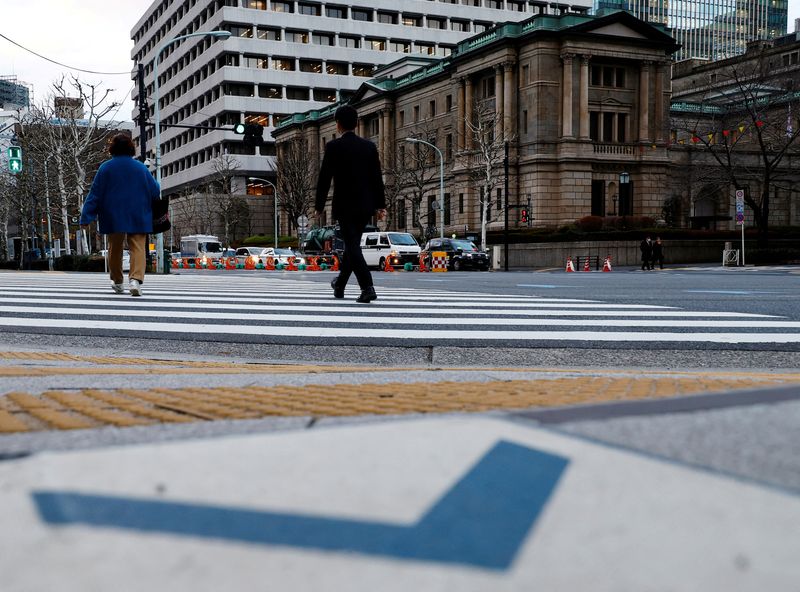By Leika Kihara and Takahiko Wada
TOKYO (Reuters) - Japan can retain its decade-old blueprint focusing on efforts to beat deflation even if the central bank were to phase out its massive stimulus with an end to negative interest rates, said the government's chief economist Tomoko Hayashi.
Under pressure by then-Prime Minister Shinzo Abe to take bolder steps to beat deflation, the Bank of Japan signed a joint statement with the government in 2013 and committed itself to achieve its 2% inflation target "at the earliest date possible."
The pledge has served as the backbone of former BOJ Governor Haruhiko Kuroda's radical monetary stimulus and justification for keeping Japan's interest rates ultra-low.
Some analysts say the statement has become out of sync as inflation has stayed above 2% for well over a year, prodding the BOJ to contemplate a near-term end to its negative rate policy.
Hayashi countered the view, saying that any such shift in BOJ policy would not alter the importance of its 2% inflation target, and the need for the government and central bank to coordinate policies to avert a return to deflation.
"The importance of this statement, which called for the need to end deflation and achieve sustainable growth, will not change," Hayashi told Reuters in an interview on Monday.
"The current framework, under which the BOJ guides monetary policy with the aim of achieving its 2% inflation target, is something very important for the government and the public."
Hayashi was involved in the drafting of the joint statement as a senior Cabinet Office official. As director-general of its Economic Research Bureau, she currently briefs Prime Minister Fumio Kishida regularly on economic developments.
Revising the statement, a move considered by some in the government last year, could affect BOJ decisions by re-defining its role and that of the government, and policy priorities.
Shortly after Kishida appointed Kazuo Ueda as BOJ governor last year, the two said they had no plan to amend the joint statement for the time being.
When asked about the statement, Kishida told parliament on Tuesday the government and BOJ must "always communicate closely" about the roles they must play in revitalising the economy.
"The government is taking steps to end deflation and achieve structural, stable wage rises accompanied by moderate inflation, so that a virtuous economic cycle is revived," Kishida said. "I hope the BOJ takes the government's economic policy into account in making monetary policy decisions."
Another factor that may affect the BOJ's exit timing is how soon the government will officially declare an end to deflation.
"To declare that Japan is permanently out of deflation, we need to ensure that Japan is no longer in a state of deflation, and that it won't revert to deflation," Hayashi said. "The latter is difficult to judge, so we're looking at various data."
Kishida has made economic revitalisation his top priority and stressed the need to push up wages to help households weather rising living costs. Critics say declaring a permanent end to deflation would help him win political scores.

"If this year's wage growth exceeds that of last year, we'll likely see a positive wage-inflation cycle kick off in Japan," Hayashi said. "We're now seeing a golden opportunity open up to put a permanent end to deflation."
Since becoming BOJ governor in April last year, Ueda has begun dismantling his predecessor's stimulus starting with a tweak to a controversial bond yield control. His recent hawkish signs have heightened market expectations of an end to negative rates by April.